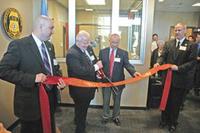-
DHS grant saves St. Louis firefighters' jobs

Thirty St. Louis, Missouri firefighters caught a break last week after the city received a $3.2 million grant from DHS; the city had planned on cutting their jobs, but the DHS grant will allow the firefighters to stay employed;the money comes as part of the Staffing for Adequate Fire and Emergency Response (SAFER) program which is aimed at helping local fire departments maintain adequate staffing levels; Federal Emergency Management Agency (FEMA) administers the grant and plans to allocate $420 million this year to fire departments across the country that have been hit by budget cuts
-
-
ICE opens office in northern Michigan

The U.S. Immigration and Enforcement agency (ICE) recently opened a permanent facility in northern Michigan; the new ICE office will provide work space for agents conducting enforcement removal operations (ERO) and homeland security investigations (HSI); the 10,000 square-foot facility will include an evidence-processing room, modern offices, and a short-term holding cell; the facility will help ICE agents secure America’s northern border;a recent Government Accountability Report found that only thirty-two miles of the nearly 4,000 mile long northern border had “an acceptable level of security”
-
-
Security cameras to be installed at all DC metro stops

In response to a rash of crimes near Washington, D.C.’s metro stations, local authorities recently announced plans to install security cameras outside all eight-six train stations; the Metro Board’s Safety and Security Committee released a report several weeks ago that found that last year the number of thefts and robberies had hit five-year highs; the Board has purchased 153 color cameras thanks to a $2.8 million DHS grant; with violent crimes around the Metro on the rise, more residents have begun to push for the installation of security cameras
-
-
Special rural training for NM park rangers
New Mexico State Park Rangers are currently receiving specialized training from the state’s Department of Homeland Security and Emergency Management; the training is designed to prepare first responders to conduct operations in rural terrain. In particular the program will address the needs of officers working along the state’s southern border with Mexico and in rural areas
-
-
$200,000 grant for upstate N.Y. fire department

Last week the city of Tonawanda in western New York received nearly $200,000 from DHS to purchase new firefighting equipment; the money will be used to purchase harnesses, ropes, victim removal devices, enhanced air supply equipment, and a new communications system; funding comes from the DHS Assistance to Firefighters Grant Program; the grant comes at a critical time as the city is struggling with its budget; several local fire departments nearby also received grants last month including those in Rochester, Youngstown, and Ridge-Culver
-
-
Half of EPA's radiation warning system in California defective
The defective sensors are part of EPA’s RadNet detection system which was created to provide an active warning system that would alert scientists and public health officials of any elevated levels of radiation so they can warn the public or take other protective measures; half of California’s twelve sensors have been sending data with “anomalies” to the EPA’s main laboratory; the faulty data results in delays of up to several hours; officials say that the sensors are fully functional and that the delays are a result of “glitches” in satellite transmissions; there are several other radiation sensors in the United States operated by local, state, and federal agencies
-
-
Washington nuclear sensors capable of detecting faintest amounts of radiation
The radiation detectors developed by the Pacific Northwest National Laboratory (PNNL) in Washington are so sensitive that they can detect trace amounts of radioactive material from hundreds of thousands of miles away; far from being a public health concern, the amount of radiation from Japan detected on the west coast of the United States was far less than what individuals receive from natural sources and is testament to the sensors extraordinary sensitivity; officials say that the PNNL’s sensors are a hundred times more sensitive than other radiation sensors; the PNNL facility is capable of picking up the faintest amounts of radioactive elements produced by nuclear reactions from the vast amounts of air particles in the world
-
-
San Francisco to regulate private biological agent detectors
Some firms have begun selling building owners and companies untested devices designed to detect anthrax and other biological agents, but city officials are worried that these will generate false alarms; in San Francisco city officials estimate that responding to a false alarm generated by a biological agent detector could cost as much as $700,000; legislation has been introduced to regulate these devices; the bill would require those who have biological agent detectors to pay an annual fee and owners would also be fined as much as $10,000 for false alarms; if passed, owners would have ninety days to register with the city
-
-
States continue to fight REAL ID
The battle against the REAL ID act rages on as states continue to oppose implementing REAL ID standards; under the law states would have to remake their driver’s licenses, restructure their computer systems, and create new intra-state data sharing networks; nearly half of the states in the country have enacted anti-Real ID bills including Maine, Alaska, South Carolina, Arizona, and Oklahoma; DHS issued its third reprieve giving states an additional twenty-one months to observe the law; the National Governors Association welcomed the decision; with the recent economic downturn and many states facing budget shortfalls, many states are struggling with the costs of implementing REAL ID standards
-
-
Madison County, IL receives $260,000 in DHS grants
Two fire departments in Madison County, Illinois were recently awarded more than $260,000 in federal grants; the grants come as part of DHS’ Assistance to Firefighters program and goes toward the purchase of new safety gear and firefighting equipment; the Wood River fire department will receive $223,556 to help pay for a high-volume foam monitor as well as foam that will be used to put out chemical fires; the Rosewood Heights Fire Protection District will receive $37,050 to procure thirty sets of new protective fire suits
-
-
U.S. reconsiders nuclear plant sites amid safety review

Following the nuclear crisis that occurred in Japan as a result of a massive earthquake and tsunami, the United States is undergoing a thorough safety review of existing plants that may affect where new plants are located; President Obama ordered the Nuclear Regulatory Commission (NRC) to conduct a comprehensive safety review of all nuclear plants in the United States; observers are particularly concerned with the Indian Point nuclear power station located forty miles north of New York City; if an accident were to occur, up to twenty million people, including eight million in New York City, would have to be evacuated
-
-
Westland, MI firefighters receive federal grant for fitness program
Westland, Michigan firefighters recently received more than $100,000 from the federal government to fund a new wellness program; the health program is designed to help prevent on the job heart attacks, which is one of the primary causes of death among firefighters; roughly 100 firefighters die on the job each year, and heart attacks are responsible for 45 percent of those deaths, a higher percentage than other public safety occupations; Westland firefighters have also received $14,800 to upgrade its radio systems to comply with state-mandated standards
-
-
Real ID pushed back a third time
To prevent massive air travel disruptions, DHS has postponed the effective date of the Real ID Act for the third time until 15 January 2013. Real ID; DHS has met congressional and state opposition in attempting to get the Real ID Act underway; sixteen states have passed laws forbidding them to comply with Real ID, and eight states have enacted resolutions effectively boycotting it altogether
-
-
Studying counterterrorism in Israel upsets Cambridge residents

Some residents of Cambridge, Massachusetts are upset that sixteen law enforcement and emergency services officials from the city went to Israel in an Anti Defamation League-sponsored trip to observe Israeli counterterrorism methods; the trip was funded by a local businessman; in a city hall meeting residents expressed discomfort with a privately organized trip for public officials — and with the fact that these officials chose Israel as the place to study counterterrorism tactics; one local resident said that what Israel calls “counterterrorism” is “a mechanism of oppression suited to employment in a police state, a status I do not regard our city as having obtained. At least not yet”
-
-
New Orleans debates hurricane protection plans

The Army Corps of Engineers is currently deciding how best to implement its $2.9 billion Mississippi River-Gulf Outlet (MR-GO) restoration plan in New Orleans; the plan is part of several projects designed to protect the Louisiana coast line from hurricane storm surges; residents are clashing over the plan and the public hearing period for the plan has been extended; state legislators are currently debating with the corps, as the $2.9 billion project funds do not include the costs for land acquisition, design, and operation and maintenance; the project is expected to take ten years to complete and construction could begin as early as 2012
-
More headlines
The long view
Smaller Nuclear Reactors Spark Renewed Interest in a Once-Shunned Energy Source
In the past two years, half the states have taken action to promote nuclear power, from creating nuclear task forces to integrating nuclear into long-term energy plans.
